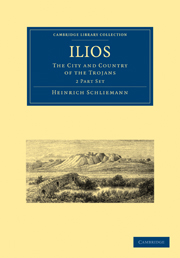Book contents
- Frontmatter
- Contents
- MAPS AND PLANS
- DIAGRAM
- COMPARATIVE TABLE OF FRENCH AND ENGLISH MEASURES, EXACT AND APPROXIMATE
- PREFACE
- INTRODUCTION.—AUTOBIOGRAPHY OF THE AUTHOR, AND NARRATIVE OF HIS WORK AT TROY
- CHAPTER I THE COUNTRY OF THE TROJANS (οἱ Τρῶες)
- CHAPTER II ETHNOGRAPHY OF THE TROJANS: THEIR SEVERAL DOMINIONS IN THE TROAD: TOPOGRAPHY OF TROY
- CHAPTER III THE HISTORY OF TROY
- CHAPTER IV THE TRUE SITE OF HOMER'S ILIUM
- CHAPTER V THE FIRST PRE-HISTORIC CITY ON THE HILL OF HISSARLIK
- CHAPTER VI THE SECOND PRE-HISTORIC CITY ON THE SITE OF TROY
- CHAPTER VII THE THIRD, THE BURNT CITY, Page 305 to 357
- THE THIRD, THE BURNT CITY, Page 358 to 413
- THE THIRD, THE BURNT CITY, Page 414 to 465
- THE THIRD, THE BURNT CITY, Page 466 to 517
- CHAPTER VIII THE FOURTH PRE-HISTORIC CITY ON THE SITE OF TROY
- CHAPTER IX THE FIFTH PRE-HISTORIC CITY OF TROY
- CHAPTER X THE SIXTH CITY, MOST PROBABLY A LYDIAN SETTLEMENT
- CHAPTER XI THE SEVENTH CITY: THE GREEK ILIUM; OR NOVUM ILIUM
- CHAPTER XII THE CONICAL MOUNDS IN THE TROAD CALLED THE HEROIC TUMULI
- APPENDIX I TROY AND HISSARLIK
- APPENDIX II ON THE RELATION OF NOVUM ILIUM TO THE ILIOS OF HOMER
- APPENDIX III THE INSCRIPTIONS FOUND AT HISSARLIK
- APPENDIX IV THYMBRA, HANAÏ TEPEH
- APPENDIX V MEDICAL PRACTICE IN THE TROAD IN 1869
- APPENDIX VI CATALOGUE OF THE PLANTS HITHERTO KNOWN OF THE TROAD, COMPILED ACCORDING TO THE COLLECTIONS OF PROFESSOR RUDOLF VIRCHOW AND DR. JULIUS SCHMIDT, AND FROM THE LITERARY SOURCES BY PROFESSOR PAUL ASCHERSON OF BERLIN, PROFESSOR THEODOR VON HELDREICH OF ATHENS, AND DOCTOR F. KURTZ OF BERLIN
- APPENDIX VII ON THE LOST ART OF HARDENING COPPER
- APPENDIX VIII ON HERA BOÖPIS
- APPENDIX IX TROY AND EGYPT
- INDEX
- Plate section
CHAPTER III - THE HISTORY OF TROY
Published online by Cambridge University Press: 05 August 2011
- Frontmatter
- Contents
- MAPS AND PLANS
- DIAGRAM
- COMPARATIVE TABLE OF FRENCH AND ENGLISH MEASURES, EXACT AND APPROXIMATE
- PREFACE
- INTRODUCTION.—AUTOBIOGRAPHY OF THE AUTHOR, AND NARRATIVE OF HIS WORK AT TROY
- CHAPTER I THE COUNTRY OF THE TROJANS (οἱ Τρῶες)
- CHAPTER II ETHNOGRAPHY OF THE TROJANS: THEIR SEVERAL DOMINIONS IN THE TROAD: TOPOGRAPHY OF TROY
- CHAPTER III THE HISTORY OF TROY
- CHAPTER IV THE TRUE SITE OF HOMER'S ILIUM
- CHAPTER V THE FIRST PRE-HISTORIC CITY ON THE HILL OF HISSARLIK
- CHAPTER VI THE SECOND PRE-HISTORIC CITY ON THE SITE OF TROY
- CHAPTER VII THE THIRD, THE BURNT CITY, Page 305 to 357
- THE THIRD, THE BURNT CITY, Page 358 to 413
- THE THIRD, THE BURNT CITY, Page 414 to 465
- THE THIRD, THE BURNT CITY, Page 466 to 517
- CHAPTER VIII THE FOURTH PRE-HISTORIC CITY ON THE SITE OF TROY
- CHAPTER IX THE FIFTH PRE-HISTORIC CITY OF TROY
- CHAPTER X THE SIXTH CITY, MOST PROBABLY A LYDIAN SETTLEMENT
- CHAPTER XI THE SEVENTH CITY: THE GREEK ILIUM; OR NOVUM ILIUM
- CHAPTER XII THE CONICAL MOUNDS IN THE TROAD CALLED THE HEROIC TUMULI
- APPENDIX I TROY AND HISSARLIK
- APPENDIX II ON THE RELATION OF NOVUM ILIUM TO THE ILIOS OF HOMER
- APPENDIX III THE INSCRIPTIONS FOUND AT HISSARLIK
- APPENDIX IV THYMBRA, HANAÏ TEPEH
- APPENDIX V MEDICAL PRACTICE IN THE TROAD IN 1869
- APPENDIX VI CATALOGUE OF THE PLANTS HITHERTO KNOWN OF THE TROAD, COMPILED ACCORDING TO THE COLLECTIONS OF PROFESSOR RUDOLF VIRCHOW AND DR. JULIUS SCHMIDT, AND FROM THE LITERARY SOURCES BY PROFESSOR PAUL ASCHERSON OF BERLIN, PROFESSOR THEODOR VON HELDREICH OF ATHENS, AND DOCTOR F. KURTZ OF BERLIN
- APPENDIX VII ON THE LOST ART OF HARDENING COPPER
- APPENDIX VIII ON HERA BOÖPIS
- APPENDIX IX TROY AND EGYPT
- INDEX
- Plate section
Summary
As Mr. Gladstone rightly remarks, the Dardanian name in the Iliad is the oldest of all those names, found in the Poems, which are linked by a distinct genealogy with the epoch of the Trojan war. As already stated, Dardanus was called the son of Zeus by Electra, daughter of Atlas, and was further said to have come from Samothrace, or from Arcadia, or from Italy; but Homer mentions nothing of this. Dardanus founded Dardania in a lofty position on the slope of Mount Ida; for he was not yet powerful enough to form a settlement in the plain. He married Bateia, an Idaean nymph, daughter of Teucer, son of the river Scamander, and begat Ilus and Erichthonius, who became the richest of all mortal men. He had in his pastures three thousand mares, the offspring of some of whom, by Boreas, produced twelve colts of supernatural swiftness. Having married Astyoche, daughter of the river Simois, he had by her a son called Tros. This latter, who became the eponym of the Trojans, had by his wife Calirrhoë, daughter of the Scamander, three sons, called Ilus, Assaracus, and Ganymedes, and a daughter, called Cleopatra. Ganymedes having become the most beautiful of mankind was carried away by the gods, and made the cupbearer of Zeus, who gave to Tros, as the price of the youth, a team of immortal horses.
- Type
- Chapter
- Information
- IliosThe City and Country of the Trojans, pp. 152 - 183Publisher: Cambridge University PressPrint publication year: 2010First published in: 1880



